Written by Grace Oktaviani
How do you spend your free time? For me, I LOVE watching my Asian series/movies/shows.
They’re super entertaining (where else will you see Goblins and Death Reapers fraternizing? – cue Korean megahit drama aptly titled ‘Goblin’). And whether or not you realise it, they also educate you about the country – such as their beliefs (yes, Koreans actually believe in goblins. It’s a part of their folklore) and culture.
So if you want a fun crash course on Thai culture, what’s better than watching a Thai production? I highly recommend starting with Thailand’s #1 series ‘Love Destiny’, a.k.a “Bupphesannivas” – a drama about the soul of a modern Thai women (named Kaedsurang) residing in the body of her twin (named Karaket) living in the 17th century, during the Ayutthaya period.
From polygamy to spiritual beliefs, the series is loaded with lesser-known Thai cultural facts that you’ve probably never heard of. So get ready to feel surprised and you never know… You might suddenly have the urge to watch Love Destiny. 😉
PS: Catch the drama on Netflix (with subs) or at Channel 3’s YouTube Channel (without subs).
Read more:
17 unique mystical places in Thailand and the fascinating stories behind them
Top 15 hospitals in Bangkok to visit for any illnesses, from Chinese medicine to plastic surgery
17 Thailand festivals, cultures, traditions and how to experience them
1. Thai men can have more than 2 wives – Polygamy
What?! It’s not outlawed? Well… Legally, you can only have one wife. However, many Thais also have other wives, which are known as Mia Noi (or minor wife/mistress). While the main wife manages the household and kids, the mistress takes care of the husband.
Whether or not they’re accepted in society is another question – some Mia Luang (or main/major wife) are okay with it, while others aren’t. But it’s a common practice that’s been around for hundreds of years, so don’t be too shocked if you find some of your Thai male friends having a Mia Noi.

2. Wind chimes are hung to attract money, fame and reputation – Wind Chimes
If you’ve watched the drama, you’ll notice that small wind chimes (in the form of a brass bell and a Bodhi leaf-shaped wind sail) are hung in front of Kaedsurang’s room and the temple. One reason for this is because Thais believe that the sound of the bells attract fortune, fame and reputation for themselves – which is why these kinds of wind chimes are used in temples to show merit.
But that’s not to say that all types of wind chimes are used for, as they’re now also used to decorate the exterior/interior of a place. So if you’re looking to increase your pocket’s worth, head into the limelight, or increase your standing among the crowds, remember to hang the correct type of wind chime.
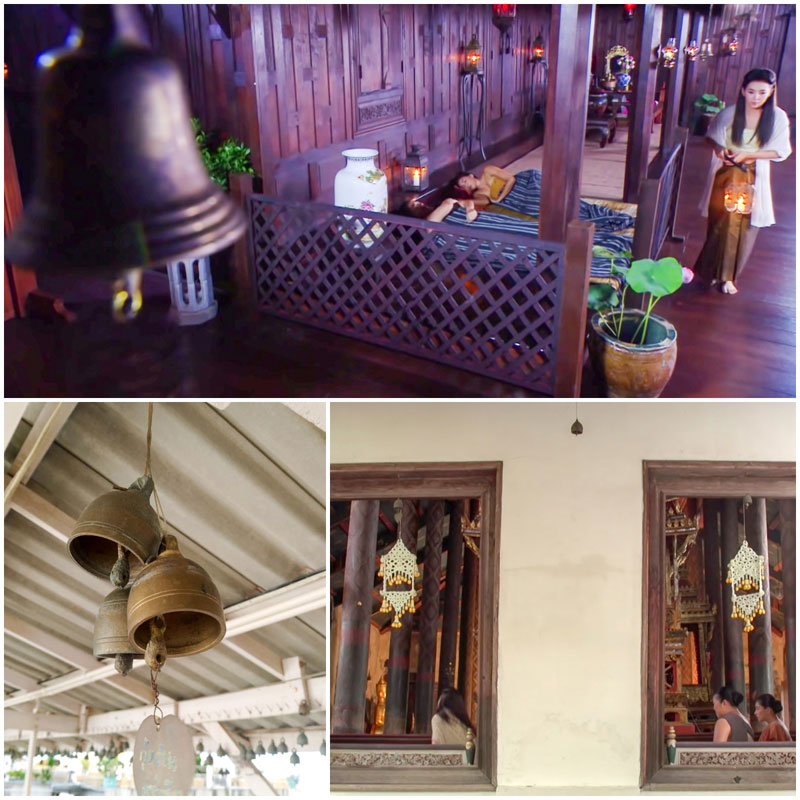
3. Thais’ lifestyle revolves around ghosts and spirits – Spiritual Beliefs
Despite how modern Thailand looks, the culture is still deeply rooted in spiritual beliefs, which was highly represented in Love Destiny.
For instance, in the beginning of the series, Karaket is killed due to the “Mon Krissana Karee” (the moon mantra) prayed by Por Det (the male lead of the series) and his family. The series also shows how the characters pay respect to the monks every morning by giving folded lotus flowers and food as alms – which people still do.
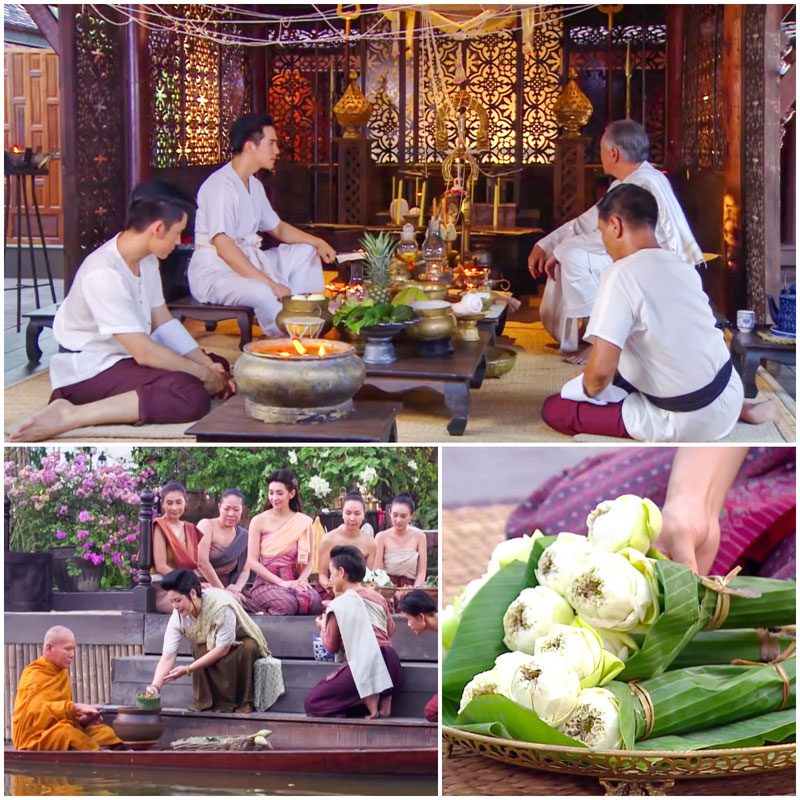
In real life, you can also find spirit houses (shrines) in almost every building as they believe housing spirits can bring prosperity – depicting how intertwined spirituality is with Thais’ everyday life.
Fun fact: Lovelorn Thais wishing to find a partner usually go to the shrine of Trimurti (the god of love), located in front of Central World, to pray every Thursday while bringing a red rose (for offering).
4. Thais believe that their King is a living God – Prostration
Whilst watching, did you notice how King Narai’s subjects all prostrate, i.e. throw themselves onto the floor facing head down, each time they face him? This might seem strange to you, but in Thailand, the Thais do this because they recognize the King as a living God. Hence, one should bow down in complete obedience without any eye contact being made when meeting – a belief that stems from Hinduism and Buddhism.
Although this practice was abolished for a while in 1873 by King Chulalongkorn, it was later reintroduced and is now still performed towards the monarchy in informal meetings as an act of respect.
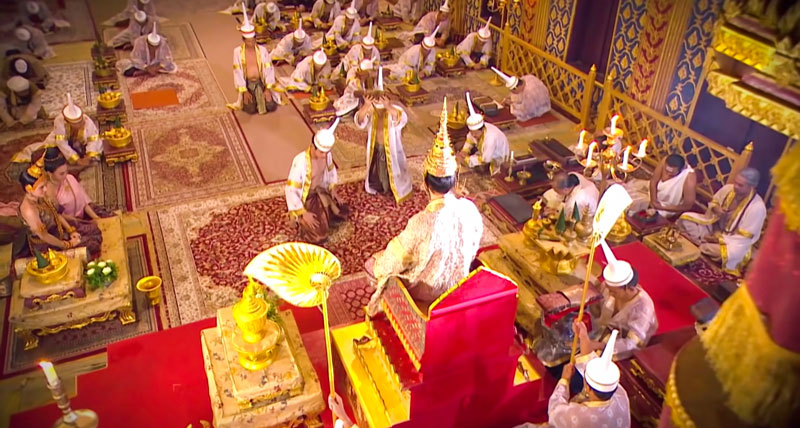
5. Colourful cloth and garlands are hung to respect tree and water spirits – Boating Ritual
Remember the boating scene in the drama, when Kaedsurang visits the long boat competition with Por Det and their other house staff? If you noticed, each wooden boat had coloured cloths wrapped at the front end of the boat. Although here it was used to mark the different teams, it’s now used to respect water spirits.
In Thailand, people believe that each tree has a guardian spirit (which is why sometimes you see huge trees being wrapped in colourful cloths). So even after the tree is cut down and made into boats, Thais believe that the spirit still resides in the wood/boat to protect it – known as Mae Ya Nang (the spiritual goddess of boats).
Hence, garlands and colourful cloths are hung in front of the boat to honor Mae Ya Nang and the water spirits so that the riders/fishermen can enjoy a safe journey, a successful career and catch many fish.
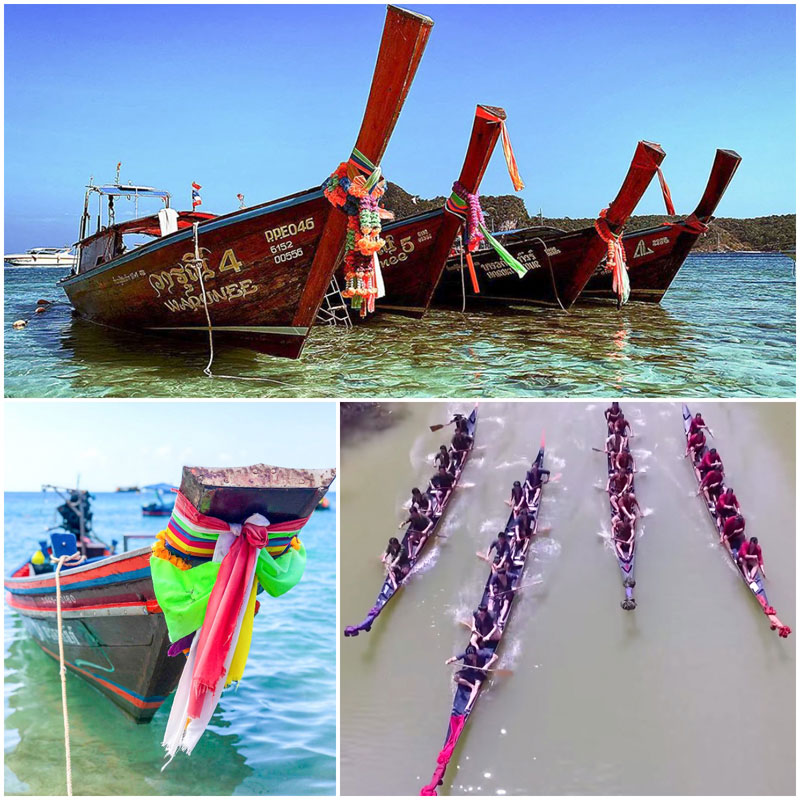
Note: Many also believe this area to be the Buddha’s head, hence the reason why monks bless this part of a longtail boat when setting off.
6. Uniforms are worn to train people to abide social norms – Uniforms
Do you know any country that requires every student (yes, including university students) to wear a uniform during their studies? Let me tell you, I’ve never seen a country that loves uniforms more than Thailand. Unless you study in a private Primary or Secondary school (which have their own set of uniforms), you’ll be wearing a standard type of uniform, like the rest of the country, until you graduate University.
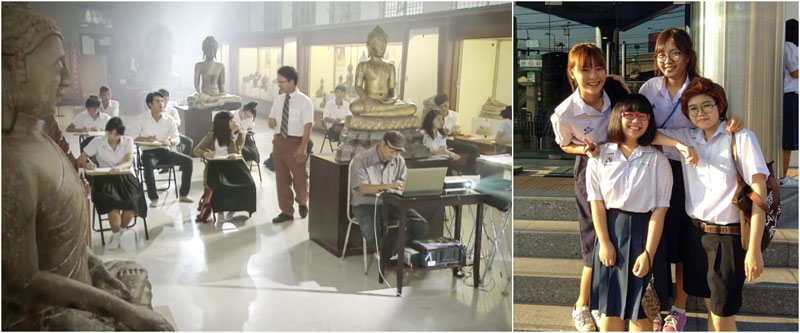
One reason for this is because Thais believe wearing uniforms will help train a person to adapt and conform, for lack of better words, to social norms and society’s standards – with uniforms being the basic step. And with Thais placing high importance on manners and norms, you can count on seeing this rule staying for a while.
7. Water is believed to wash away bad luck – Water
If I ask you which Thai event requires water, I bet you’ll probably answer “Songkran”. But did you know that not only Songkran uses water, but traditional Thai wedding ceremonies too?! That’s because Thais believe water can wash away bad luck.
That’s why when Kaedsurang and Por Det get married in the drama, the monk pours water on the bride and groom to get rid of any bad luck, illness and evil. And in the case of Songkran, to erase all the misfortune from the previous year (Songkran is actually Thailand’s New Year).
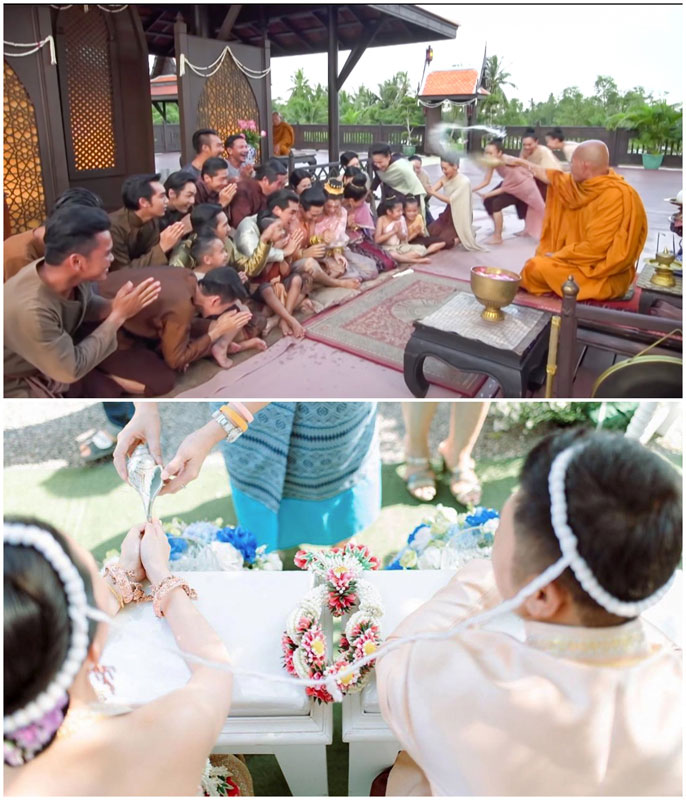
8. Foi Thong is influenced by the Portuguese dish “Fios de ovos” – Thai Dessert
If you love sweets, you’ve most likely tasted the golden yellow Thai sweet sold in streets and dessert stores (that look like angel hairs). Believe it or not, this particular dessert (known as Foi Thong) isn’t 100% Thai, but actually influenced from the Portuguese sweet ‘Fios de ovos’.
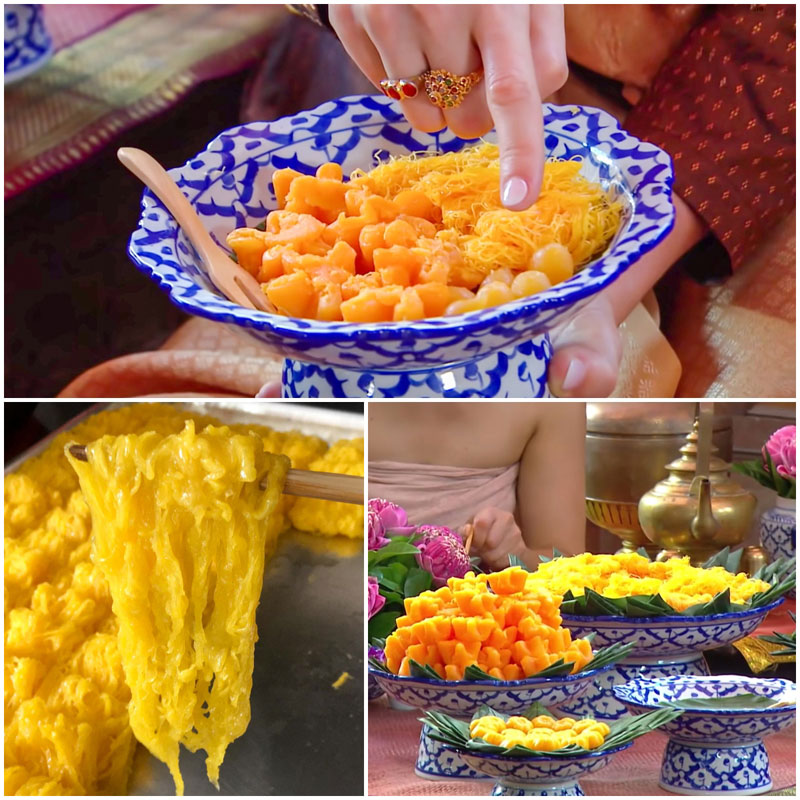
The origin of the dish is actually explained in the drama, where Maria Guyomar de Pinha (a.k.a. Thong Kip Ma) creates Foi Thong, Thong Yip and other desserts. As Maria Guyomar de Pinha is a Thai born of Portuguese and Japanese ancestry, the desserts she creates naturally are influenced by Portuguese cuisine.
In reality, not just Foi Thong but other dishes were also, and still are, influenced by other cuisines, such as curry from Indian cuisine and stir-fried dishes from Chinese cuisine.
9. The Siamese military were trained to use any tools as deadly weapons – Krabi Krabong (still practised today!)
You might have only heard of Muay Thai, but did you know that there is actually another deadly martial art? (Originally what the Siamese military were trained in.) Meet Krabi Krabong – a weapons-based martial art. The advantage being you’d be able to utilise any kind of weapon or everyday object in a fight – a very useful technique when you’re at war!
This is seen in the scene when Kaedsurang barges into the training grounds where Siamese warriors are training with a Krabi (curved sword), Krabong (staff) and other weapons.
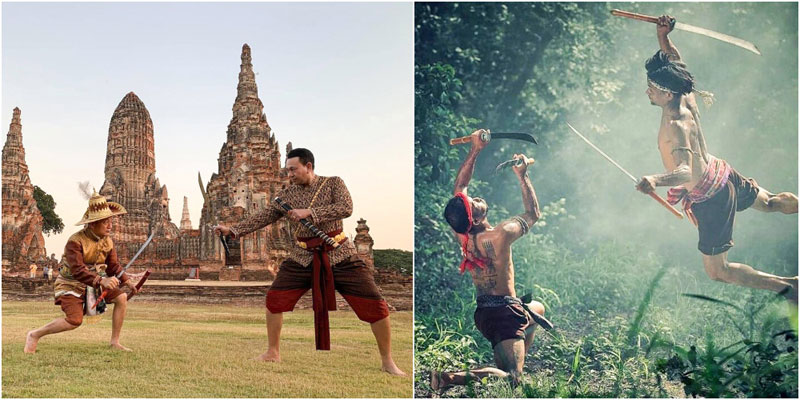
With a total of 108 dances in Krabi Krabong, and each weapon having their own routine, this makes Krabi Krabong a great martial art to learn as you can apply it in real life for self-defense.
10. Thailand’s 700-year-old favourite pastime activity – Cockfighting
Where do you go when you want to chill? The malls or the cinemas?
Modern Thais do that too, but a favourite pastime activity that’s been around for 700 years and is still favoured today, is cockfighting. Unlike bullfighting, which requires one to subdue or even kill the bull, cockfighting is judged solely on the fighting skills of the roosters. Hence, the roosters aren’t badly harmed.
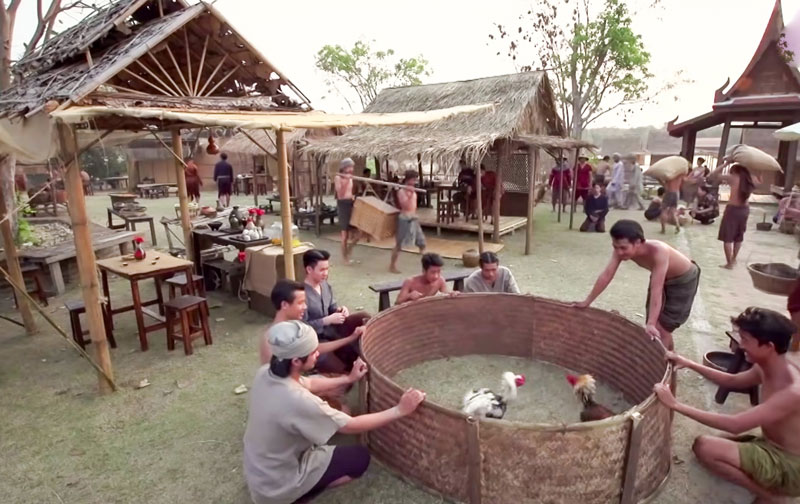
Believe it or not, cockfighting draws in big crowds too – which is why top fighting roosters can be worth as up to 3 million Baht (and bets can go as high as 22 million Baht!!). So whether it’s Por Det’s lackey during the Ayutthaya period or 21st century Thais, you can be sure to find passionate cockfighting fans throughout the country.
11. Phuang Malai is used to show respect or as a gift – Floral Garland
Wondered what those beautiful round, white flowery things are that you keep seeing in Love Destiny? Those are called Phuang Malai (or floral garland). They might all look the same (it’s usually a round garland with tentacle-like tails), but there are actually various uses for them.
The most common usage is as a sign of respect, usually for Buddha statues and monks. It can also be used as a gift, as seen in this drama when Lady Chanwat presents a handmade Phuang Malai to Por Det’s mother. Otherwise, you can also use it to decorate your home.
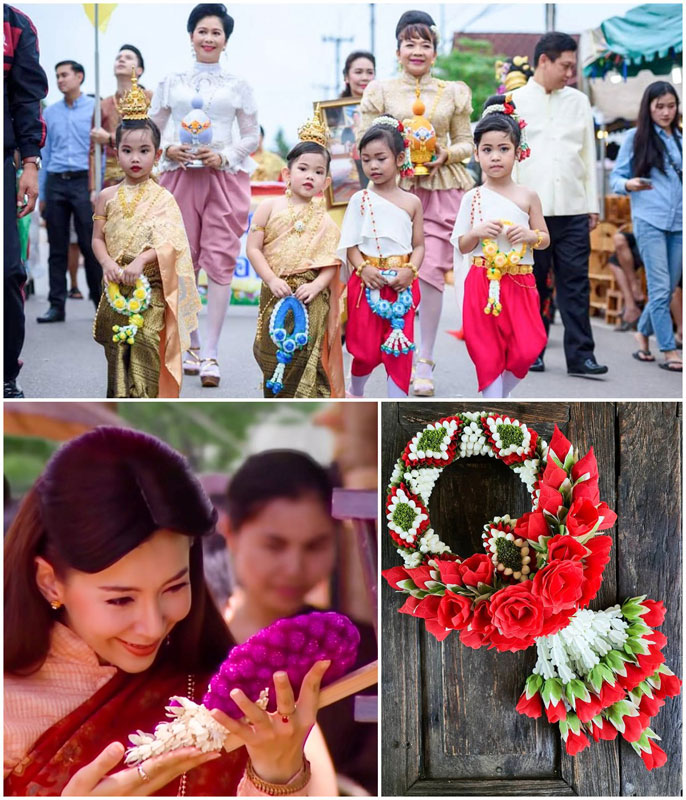
12. Welcome to the world of edible art – Vegetable & Fruit Carving
If you paid enough attention to the drama, you might have seen an intricate display of a food-artwork placed in the middle of the table each time Por Det’s family is having a meal. That piece of work is known as ‘Kae Sa Luk’, meant to please your eye and palate during the meal.
You don’t really eat carved vegetables or fruits in Thailand (unless you’re super hungry, but that’s for another day). But having it as part of your dining experience can upgrade your regular rice and curry to new “visual” heights!
This practice is more prominent in the past, but you can still see simpler food carving works nowadays such as in restaurants.
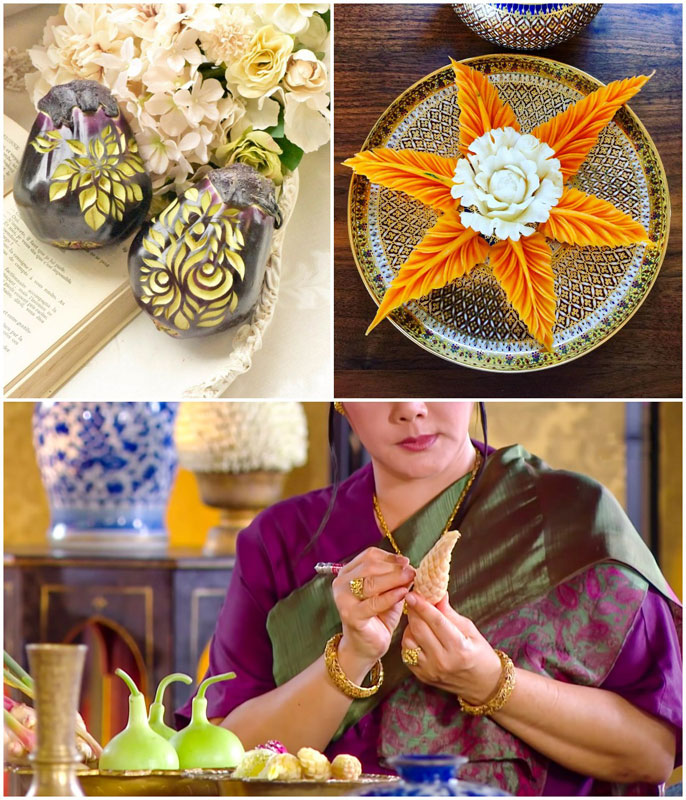
13. Paying respects to your elders is crucial in Thai society – Wai
Like most Asian countries, Thai culture places high importance in respecting your elders, superiors and parents.
One of the most common ways this is done in Thailand is through “wai” – a Thai greeting that consists of putting two palms together and bending down slightly. Otherwise, you can also show respect by calling an older person “Pee” – just like how Kaedsurang calls Por Det “Khun Pee” – and ending your sentences with “Ka” or “Kap” (applicable when speaking to both someone older or younger than you).
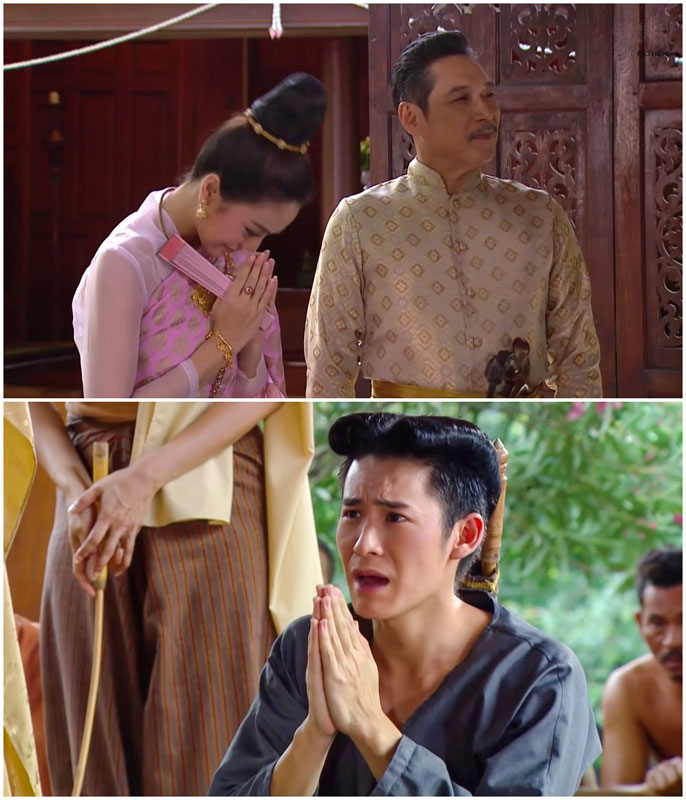


 简体中文 (Chinese)
简体中文 (Chinese) Bahasa Indonesia
Bahasa Indonesia